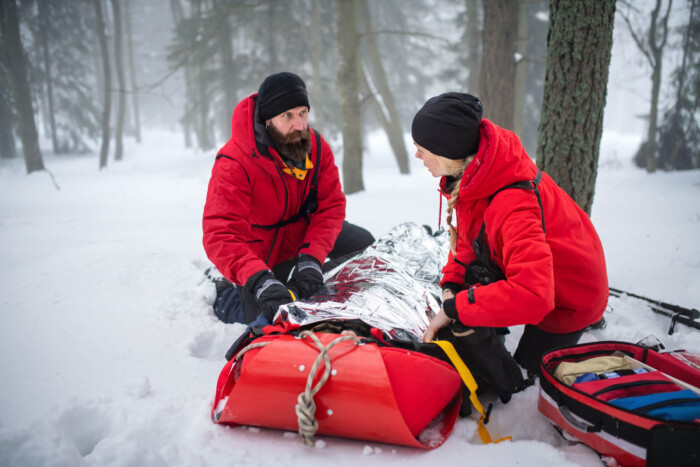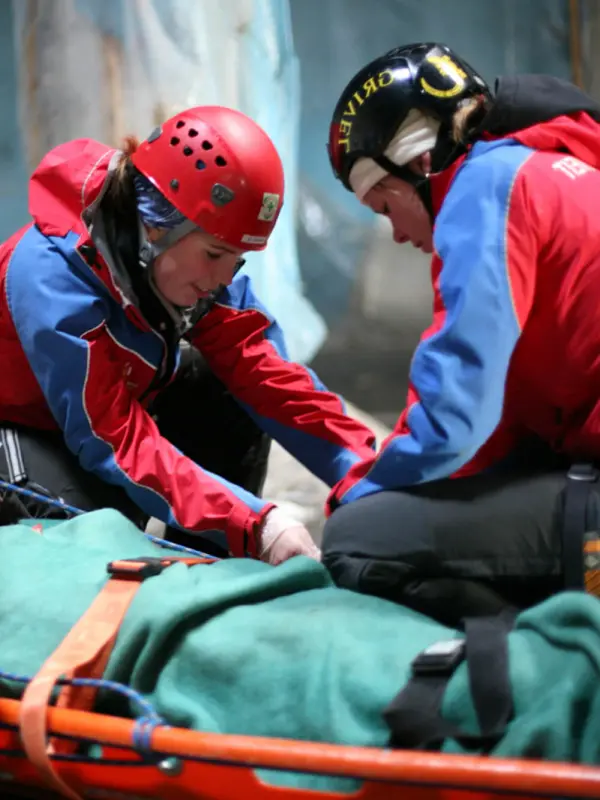Bridge (WAFA to WFR)
- Minimum Duration
- 36 Hours
- Minimum Age
- 16
- Minimum Cost
- $378+ USD
- Skill Level
- Any

Description
Build on your Wilderness Advanced First Aid (WAFA) skills to transition to the scope of practice and competency of a Wilderness First Responder (WFR). This course must be taken within three years of WAFA certification to qualify.
Pre-course review is required to ensure you have the foundational knowledge to successfully bridge from a WAFA to a WFR in 4 days. This course may also be used as a recertification opportunity for eligible WFRs and for WMA WEMS Upgrade graduates.
Curriculum
The WAFA to WFR Bridge course involves a minimum of 36 hours of instruction when taught in the United States and 40 hours when taught in Canada. Hours vary in other countries. During the course, students learn the essential principles and skills required to assess and manage medical problems in isolated and extreme environments for days and weeks if necessary.
Requirements
Students bridging to a WFR must hold a current (non-expired) Wilderness Advanced First Aid certification.
Students will have access to the pre-course assignments 2-4 weeks prior to course. Students should complete the study guide in preparation for the course. It was designed to familiarize students with the essential points in the curriculum. Instructors will collect it at the beginning of the course but it will not be figured in to the final grade.
Eligibility
Eligible WAFA to WFR Bridge students are current graduates (not expired or within a grace period) from:
- A WAFA course with a minimum of 36 hours of overall instruction.
- If using this course as a recertification opportunity, a WFR course with a minimum of 70 hours of overall instruction, including a minimum of 45 hours of in-person instruction is required.
- Outdoor Emergency Care (OEC) certification holders are eligible to recertify in WMA recertification courses. Upon successful completion, students will receive a WFR certification.
- Additional pre-course work will be required.
- Some work may require high speed internet.
Prior to enrolling, please review our Functional Position Description. The criteria in this policy allow students to self-assess their ability to meet the demands of a WMA International course as well as the demands of a certified wilderness medical provider in the field.
Evaluation
This course is pass/fail. 100% attendance is mandatory. Evaluation is based on practical patient simulations, hands-on activities, and a written test. WMA International is committed to making reasonable accommodation for any student with special needs.
Recertification
Certifications are valid for three years. Graduates of this course may re-certify by taking a Wilderness First Responder Recertification course or by retaking this Bridge (WAFA to WFR) course.
Course Topics
- The general principles of wilderness and rescue medicine with an emphasis on identifying medical emergencies, critical thinking, and risk management.
- Patient assessment and emergency care including CPR and AED use, basic life support skills, the patient assessment system, patient reporting, and calling for help.
- Treatment of injuries from traumatic mechanisms and the treatment of musculoskeletal problems such as overuse syndromes and dislocations.
- Environmental medicine including illness and injuries related to altitude, temperature, lightning, submersion, and environmental toxins.
- Backcountry medicine including the assessment and treatment of common medical problems.
- Non-technical lifting, moving, and extrication of patients with an emphasis on spinal motion restriction when applicable.
- Practical Skills including bleeding control, wound management, bandaging, splinting, spine stable patient packaging, hypothermia management, medical kit preparation.
- WMA International wilderness protocols including treatment of anaphylaxis, wound management, CPR in a remote setting, spine injury assessment, reduction of simple dislocations, and treatment for severe asthma.
Course Topics
- The general principles of wilderness and rescue medicine with an emphasis on identifying medical emergencies, critical thinking, and risk management.
- Patient assessment and emergency care including CPR and AED use, basic life support skills, the patient assessment system, patient reporting, and calling for help.
- Treatment of injuries from traumatic mechanisms and the treatment of musculoskeletal problems such as overuse syndromes and dislocations.
- Environmental medicine including illness and injuries related to altitude, temperature, lightning, submersion, and environmental toxins.
- Backcountry medicine including the assessment and treatment of common medical problems.
- Non-technical lifting, moving, and extrication of patients with an emphasis on spinal motion restriction when applicable.
- Practical Skills including bleeding control, wound management, bandaging, splinting, spine stable patient packaging, hypothermia management, medical kit preparation.
- WMA International wilderness protocols including treatment of anaphylaxis, wound management, CPR in a remote setting, spine injury assessment, reduction of simple dislocations, and treatment for severe asthma.
